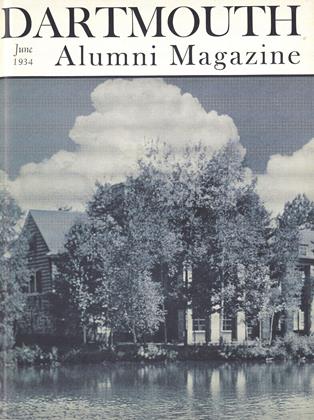By Sydney A. Clark. New York: Mcßride. 1934.
Just as I began to write, a person walking past my desk spied the cover on Mr. Clark's latest addition to his travel series, and exclaimed—"England on fifty dollars! Sounds swell, but I don't think you could see much of England for fifty dollars. It's an expensive country."
If Mr. Clark succeeds only in dispelling the all too common notion that England is an expensive country, his book will have been well worth while. For during recent years travellers avoided England as though a plague infested it, because "It's so expensive."'At the same time perhaps no other country has the same fascination for an American, as that in which his country's culture has its chief roots. But travel in • England has never been of the bargain kind, or so cheap, that it was less costly to travel there than to stay at home, such as was alleged to be true of Majorca before so many people found out it was cheap. Rather, travelling and living in England is about as expensive as in the United States. And Mr. Clark's book with the startling title shows that if one doesn't always stop at the Mayfair, or is willing to ride thirdclass in English trains, as nearly every Englishman does, then one has a good chance to see a surprising amount of England, for ten pounds, remaining in the country on this small sum, ten days. It means, however, that one must provide or find, a great deal of his own entertainment, for such a budget does not allow many theatres or night clubs. On the other hand, in travelling, particuarly in a country like England, one is most interested in attempting to discover how the English live, in visiting the points of historic interest, and in comparing English scenes and institutions with their American prototypes, and such investigation is generally inexpensive, the expenditures being limited to nominal fees.
There is little use in attempting to describe the itineraries that Mr. Clark suggests. Everyone has in mind the places and things in England in which he is particularly interested, and it is pleasing to find how many have been included in this guide. If there are some things that have not been mentioned, those whose geographical memory is especially keen will immediately notice that often they would simply be stop-overs en route to something that the author had preferred to visit. So if you have ten pounds (today this would be about $51.30), over and above the cost of passage, and an unsatisfied urge to see England, by all means get Mr. Clark's book, and find out for yourself that "England on fifty dollars" is not a snare and delusion. For there you will find how it is possible, on a sum hitherto regarded as insufficient, to see a lot of the "land where spelling is divorced from pronunciation." And finally, if there is anything unpleasant about this book, it is the format,—the inner margins of the type page are so narrow that one has to turn himself or the book on end in order to read the last word on every line, or else grip it so tightly to hold the page flat, that one's fingers develop cramps.
 View Full Issue
View Full Issue
More From This Issue
-
 Class Notes
Class NotesClass of 1923
June 1934 By John C. Allen, "Graham Whitelaw" -
 Article
ArticleHANOVER BROWSING
June 1934 By Rees H. Bowen -
 Class Notes
Class NotesClass of 1910
June 1934 By Harold P. Hinman -
 Sports
SportsBaseball
June 1934 By C. E. Widmayer '30 -
 Class Notes
Class NotesClass of 1908
June 1934 By L. W. Griswold -
 Class Notes
Class NotesClass of 1914
June 1934 By Edwrd Leech, Ed Leech
Books
-
 Books
BooksUNFINISHED BUSINESS,
August 1944 -
 Books
BooksAlumni Publications
May 1945 -
 Books
BooksEDITOR’S PICKS
MARCH | APRIL 2014 -
 Books
BooksCONTROL ENGINEERS' HANDBOOK.
OCTOBER 1958 By A. I. HECKBERT -
 Books
BooksMAURICE HEWLETT: HISTORICAL ROMANCER
January 1939 By David Lambuth -
 Books
BooksEUROPEAN POLICIES OF FINANCING PUBLIC EDUCATIONAL INSTITUTIONS. IV. GERMANY
June 1939 By Louis P. Benezet '99

